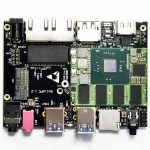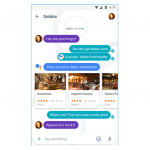HP Sprocket for iPhone and Android is a cute portable photo printer for millennials

Now that smartphones have high-quality cameras, people seem to be snapping more photos than ever. Thanks to the cloud, it is super easy to back up those images, and then consume them on a device at a later date. There is no need to print photos anymore, right? Not so fast. Actually, if you head to your local CVS or Walgreens drug stores, you will see many people still having photographs printed for frames and albums. Are these people just creatures of habit or Luddites? Perhaps. Regardless, there is a demand for photo printing.
HP has a new portable photo printer that is downright cute. Called 'Sprocket', it is compatible with both iOS and Android, letting the user print photos on the go. Millennials should go wild for this thing, as you can customize the photos with filters and virtual 'stickers' using a special app before sending them to print over Bluetooth. Not to mention, you can peel off the back to expose an adhesive -- yes, you can stick them on things! Best of all? It doesn't use any toner or ink! No, it is not magic -- it uses a really cool 'ZINK' technology.
Microsoft will sell 'Minecraft: Education Edition' on the Windows Store in November

Back in January, Microsoft announced Minecraft: Education Edition. Later, the company released an 'early access' version to some educators. At the time, some folks were dubious that a video game could serve as a legit tool in the classroom. With that said, Minecraft isn't really a video game in the traditional sense -- it can be viewed more as a virtual world. In theory, the platform could better engage young students when compared to, say, sitting in a dull classroom and staring at a chalkboard.
Whether Minecraft: Education Edition will be a success remains to be seen, but we will find out soon. You see, on November 1, the tool will leave 'early access' and become available to all educators. It will be sold, of course, on the Windows Store. It will cost $5 annually per user, but Microsoft promises price breaks for school districts that purchase certain licenses. In other words, larger districts can likely negotiate to pay less per user.
Healthcare, Telecommunications, Retail and Transportation: How do they stack up on security awareness?

Breaches and attacks have run rampant through most major industries, and organizations are beginning to realize the importance of employee and stakeholder security awareness. Healthcare and retail have been in the brightest spotlights with the rise in ransomware and credit card data breaches in the last couple of years, but they are not the only ones facing this challenge. Wombat Security's Beyond the Phish report found that telecommunications and transportation industries also struggle with a wide range of security issues.
Ultimately, an organization can improve its defenses by elevating the level of security best practices across its employees and addressing the biggest offending categories of awareness.
Five strategies for creating a culture of information security

Data protection has historically been viewed as a function owned by a few individuals, or the domain of the IT department. However, it is vital that all employees share the responsibility of preventing and mitigating information security breaches.
When an organization creates a corporate culture dedicated to data protection, it provides more disciplined operations, increased customer and stakeholder trust, and minimized risk.
Yahoo confirms 'state-sponsored' attack and theft of 500 million account details

Yahoo users who have not changed their passwords for a while are being advised to do so. The company has confirmed that it suffered a major security breach back in 2014 and information relating to 500 million accounts was stolen.
Yahoo says that the attack was carried out by a "state-sponsored actor" but does not elaborate on who it might be. The data accessed includes "names, email addresses, telephone numbers, dates of birth, hashed passwords (the vast majority with bcrypt) and, in some cases, encrypted or unencrypted security questions and answers".
Education will shift away from classrooms in the future

Classrooms could be a thing of the past by 2025, according to new research by Polycom. Its Education in 2025 -- Technology Innovation survey takes a closer look at education and technology and has some interesting takeaways. While almost two thirds (64 percent) of respondents believe students engage with content primarily in the classroom, just a quarter (25 percent) believe that will still be the case in ten years' time.
More than half (53 percent) of education professionals believe real-time video collaboration and mobile devices will be the number one way students will engage with content in 2025. At the moment, however, things should be much, much better than they are.
The Dark Web isn't really as safe as criminals think

You aren't really safe on the Dark Web. That runs counter-intuitive to the reason for its existence. Then again, it isn't really the kind of place you want to go anyway. It's a series of sites that exist on darknets, an overlay network designed to keep things hidden and with good reason -- it's usually used for criminal activity.
But if you know how to get there then you can make some money -- selling drugs, weapons, malware and anything else that can cause harm.
SolidRun x86 Braswell MicroSoM runs Linux and full Windows 10, destroys Raspberry Pi

The Raspberry Pi is popular for three major reasons -- it is small, inexpensive, and doesn't consume a lot of electricity. This makes the board very popular for things like education, servers, IoT projects, and media playback. Unfortunately, as many consumers find out quickly, the Raspberry Pi computers are woefully underpowered for some needs. In other words, despite the low cost, it isn't necessarily a bargain.
Today, SolidRun announces an Intel Braswell-based MicroSoM. Unlike the ARM-powered Raspberry Pi, this is x86 compatible, meaning it can run full Windows 10. Plus, if you install a Linux distro, there will be far more packages available, such as Google Chrome, which is not available for Pi. Heck, it can probably serve as a respectable desktop. Even though it costs more than the Raspberry Pi, is it a better deal?
Security commentator Brian Krebs hit with the biggest DDoS attack ever

Attacks on websites are a daily occurrence so to get any real attention an attack needs to be something special. Starting on Tuesday, Brian Krebs' security blog, KrebsOnSecurity.com, was hit with what is being described as "the largest DDoS the internet has ever seen".
Despite being clobbered with a colossal 665 Gbps of traffic, Krebs' site remained online thanks to the anti-DDoS efforts of security firm Akamai. It is thought that Krebs was targeted for his exposés of hackers, and the attack was delivered via a huge number of hacked IoT devices.
More than half of IT pros don't erase data properly

A new study reveals that 53 percent of IT professionals use common, but ineffective, methods to erase data on corporate computers, external drives and servers.
The survey by Blancco Technology Group of over 400 professionals worldwide found that 31 percent report dragging individual files to the Recycle Bin and 22 percent reformat the entire drive.
Marketers lose $100 million to mobile app advertising fraud

App marketers will lose up to $100 million in 2016 due to mobile app install and engagement advertising fraud according to a new study.
The research from mobile analytics company AppsFlyer shows that the losses come from fraudulent click data, paid installs from fraudulent devices, and fraudulent and simulated in-app events.
Many reports of exploding Samsung Galaxy Note7 units are false

We have heard lots of stories about exploding Galaxy Note7 devices, but how many of them are actually true? In another episode of the Galaxy Note7 recall saga, Samsung has revealed that it has received multiple false reports from consumers claiming that their new smartphone caught fire, suggesting that, perhaps, there are fewer destroyed units in the wild than we have been lead to believe.
Samsung says that it has dealt with 26 such reports from alleged Galaxy Note7 owners, and that in 12 cases it has been unable to find an issue with those devices. What about the rest of the claims?
Hands-on with Allo, Google's sort-of smart messaging app

Does the world need another messaging app? We’re not sure, but Google is giving us another one anyway, launching Google Allo for Android and iOS.
Key features include "Smart Reply", which analyses incoming messages and suggests appropriate responses you can send with a tap.
Microsoft raises dividend, launches $40 billion share buyback program

Microsoft has authorized a share buyback program that will see the company reacquiring $40 billion of its own shares, just over nine percent of the company.
This is the fourth $40 billion buyback program launched by the company, which said that it will complete the first round by the end of this year. Microsoft's most recent buyback was first announced in 2013 and is scheduled to be completed by the end of 2016.
Enterprises are learning from cyber attacks but bad habits persist

A majority of enterprises (79 percent) say they have taken action to improve their security in response to major cyber attacks. However, 40 percent of organizations still store privileged and admin passwords in a Word document or spreadsheet, while 28 percent use a shared server or USB stick.
This is among the findings of the 10th annual Global Advanced Threat Landscape Survey from cyber security company CyberArk which looks at whether organizations are learning lessons from cyber attacks.
Most Commented Stories
© 1998-2024 BetaNews, Inc. All Rights Reserved. Privacy Policy - Cookie Policy.




